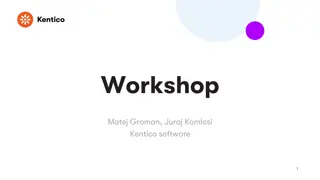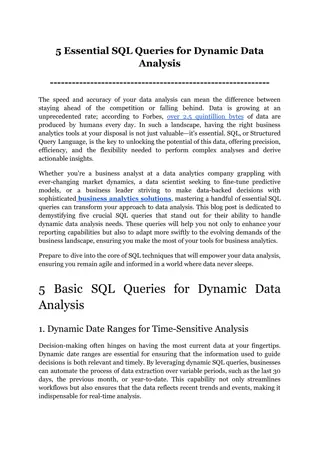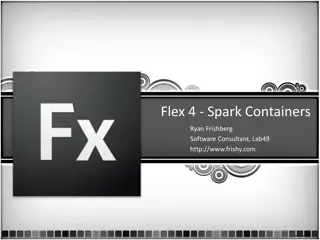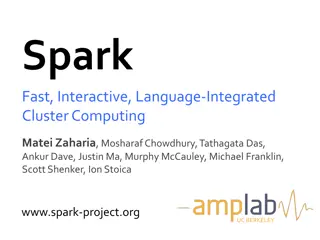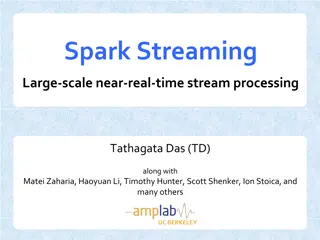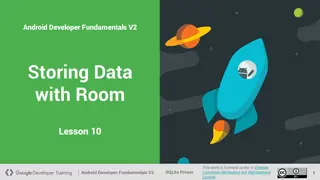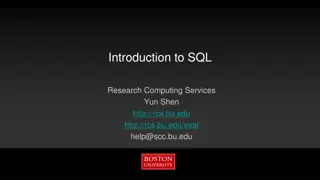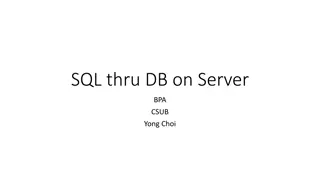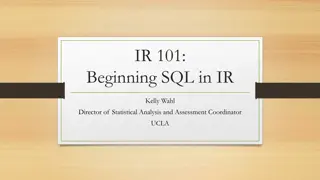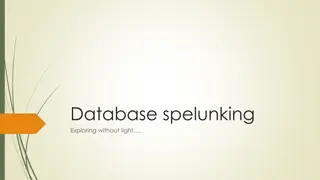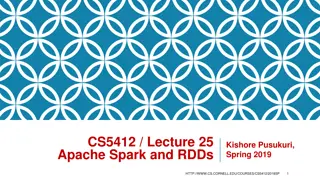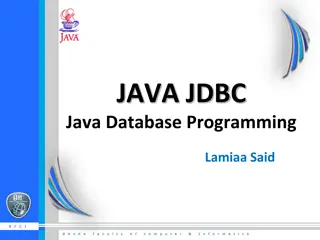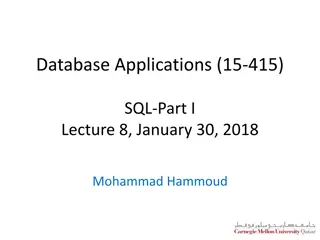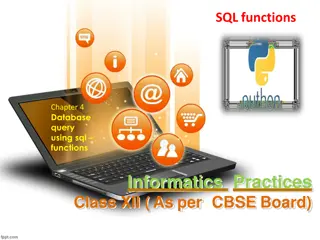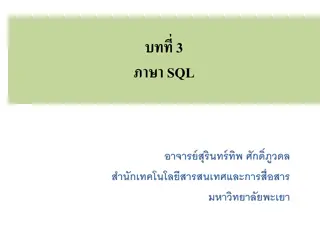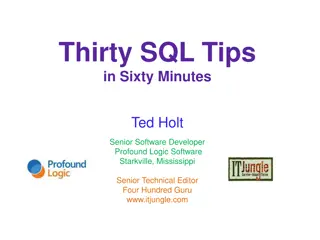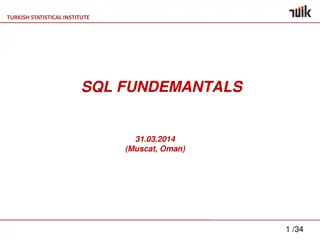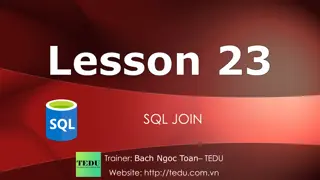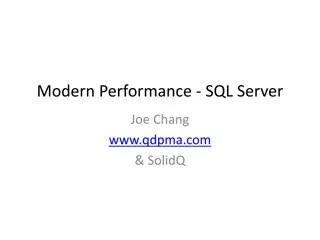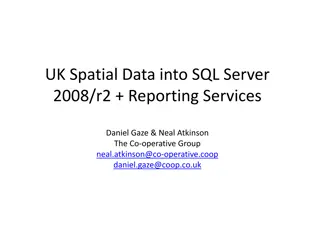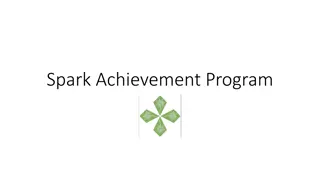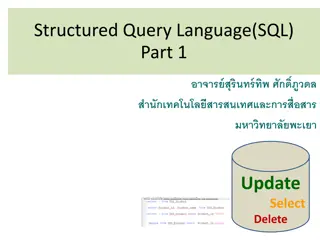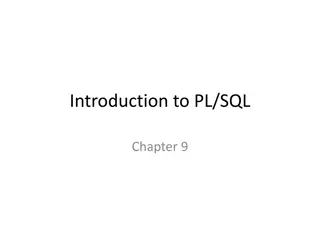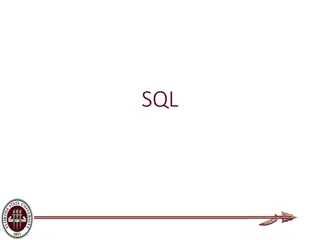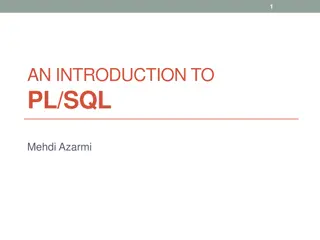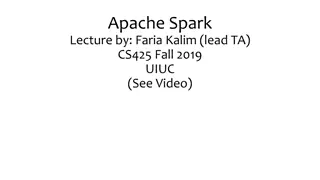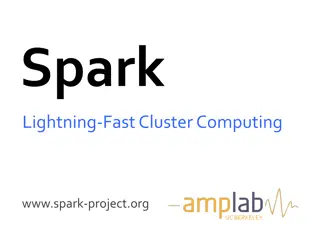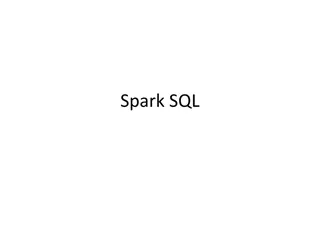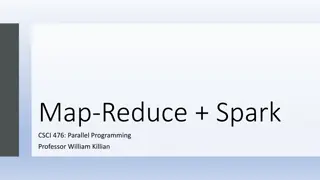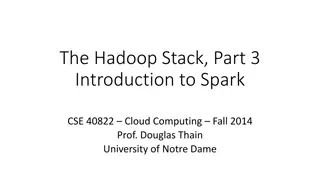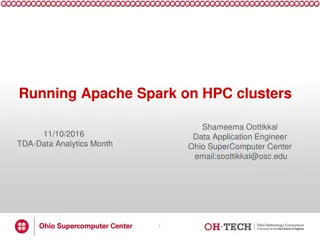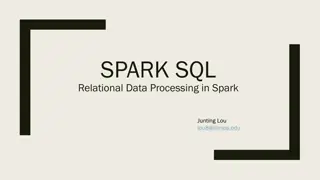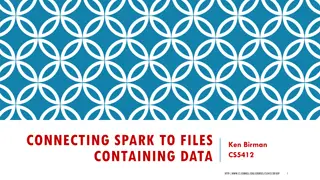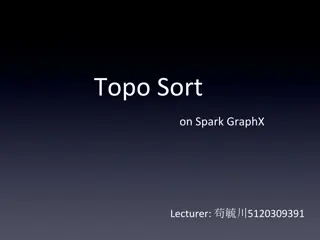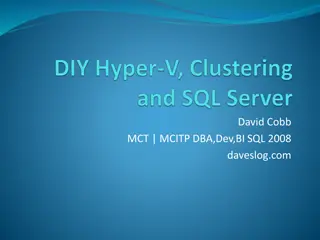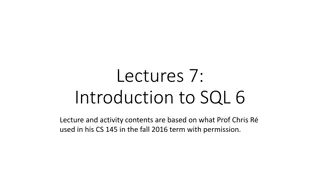Security Breach: Detecting and Exploiting SQL Injection in Contact Groups
Suspect a potential SQL injection in the macros used in Contact groups? Learn how to identify and exploit it through blind SQL injection techniques. Follow step-by-step instructions to execute a payload that alters user data and gain unauthorized access. Stay vigilant and proactively safeguard your
3 views • 27 slides
5 Essential SQL Queries for Dynamic Data Analysis
Explore the transformative power of SQL with our latest guide, which highlights five critical SQL queries essential for dynamic data analysis. This post covers how these queries can be utilized by business analytics tools to enable data analysts, scientists, and BI professionals to extract actionabl
6 views • 8 slides
Understanding Spark Containers and Layouts in Flex 4
Learn about Spark Containers in Flex 4, their types, differences from MX Containers, assignable layouts, what containers can hold, and more. Explore how components are sized and positioned using layout objects in Spark.
3 views • 30 slides
Understanding Apache Spark: Fast, Interactive, Cluster Computing
Apache Spark, developed by Matei Zaharia and team at UC Berkeley, aims to enhance cluster computing by supporting iterative algorithms, interactive data mining, and programmability through integration with Scala. The motivation behind Spark's Resilient Distributed Datasets (RDDs) is to efficiently r
0 views • 41 slides
Introduction to Spark Streaming for Large-Scale Stream Processing
Spark Streaming, developed at UC Berkeley, extends the capabilities of Apache Spark for large-scale, near-real-time stream processing. With the ability to scale to hundreds of nodes and achieve low latencies, Spark Streaming offers efficient and fault-tolerant stateful stream processing through a si
0 views • 30 slides
Understanding Different Types of SQL Joins
Explore the various types of SQL joins such as INNER JOIN, LEFT (OUTER) JOIN, RIGHT (OUTER) JOIN, and FULL (OUTER) JOIN. Learn how each type functions and the syntax for implementing them. Get insights into examples of INNER JOIN and LEFT OUTER JOIN operations to enhance your SQL knowledge.
0 views • 26 slides
Understanding SQLite and Data Storage with Room in Android Development
SQLite is a self-contained, serverless, and zero-configuration SQL database engine used in Android development. This primer covers how data is stored in tables, columns, and rows, and provides a refresher on SQL databases, assuming familiarity with SQL query language. Room library simplifies SQLite
1 views • 26 slides
Learn SQL Basics: History, Syntax, and Terminology
SQL (Structured Query Language) is a specialized domain-specific language for managing structured data in relational databases. Developed in the 1970s, it follows a rigid syntax and structure, with specific features like triggers and stored procedures. Understanding SQL history, terminology, and syn
1 views • 38 slides
SQL Queries for Database Management
Explore a series of SQL queries for efficient database management, including selecting specific records, sorting data, and counting customers by country. Enhance your SQL skills with these practical examples showcasing various query types and techniques.
0 views • 10 slides
Understanding SQL Triggers in Relational Databases
SQL triggers are stored procedures that are automatically invoked when certain events occur in a database, such as insertions or updates to tables. This article explains the definition of triggers, their syntax, types, and examples of DML triggers in SQL servers. It also covers the concept of row-le
5 views • 19 slides
Introduction to SQL: Learn the Basics and Beyond
Explore the world of Structured Query Language (SQL) with this comprehensive guide. Discover what SQL is, its history, usage, and how to learn it on your own through free online tutorials. Understand the properties of relational databases and get insights into designing a relational database. With S
0 views • 29 slides
Mastering SQL Server: Tips and Tricks for Efficient Database Exploration
Delve into the world of SQL Server with expert tips on finding instances, listing databases, and searching for tables or columns by name. Discover efficient ways to navigate relational databases using SQL queries, PowerShell, and Management Studio, making database exploration a breeze.
0 views • 14 slides
Spark: Revolutionizing Big Data Processing
Learn about Apache Spark and RDDs in this lecture by Kishore Pusukuri. Explore the motivation behind Spark, its basics, programming, history of Hadoop and Spark, integration with different cluster managers, and the Spark ecosystem. Discover the key ideas behind Spark's design focused on Resilient Di
0 views • 59 slides
Introduction to Database Systems and SQL Programming
Understanding database systems is crucial in today's digital world. Explore the basics of database systems, SQL statements, and Java Database Connectivity (JDBC) in this comprehensive overview. Learn about DBMS, SQL querying, JDBC API, and more to enhance your understanding of managing and interacti
8 views • 24 slides
Understanding SQL: Major Aspects and Functionality in Database Applications
SQL, as a relational database language, offers Data Manipulation Language (DML) and Data Definition Language (DDL) for querying and modifying data. Additionally, SQL encompasses triggers, embedded code execution, remote database access, transaction management, and security features for efficient dat
1 views • 52 slides
Understanding SQL Functions for Database Queries
SQL functions are essential elements in performing actions and obtaining results in a database query. They come in two main types: scalar functions and aggregate functions. Scalar functions operate on single values, while aggregate functions operate on sets of data. Examples of SQL functions include
0 views • 14 slides
Comprehensive Overview of SQL Commands and Language Categories
In this detailed guide, you will learn about Structured Query Language (SQL) including its various commands such as Data Definition Language (DDL), Data Manipulation Language (DML), Data Control Language (DCL), and Transaction Control Language (TCL). Explore how SQL is used in Database Management Sy
0 views • 15 slides
SQL Tips to Enhance Data Sorting Techniques
Gain valuable insights into SQL tips for optimizing data sorting techniques. Learn how to utilize column numbers for efficient sorting, implement non-alphabetic sorting techniques, ignore case in sorts and comparisons, and access data in arrival sequence using the RRN function. These tips are design
0 views • 44 slides
Turkish Statistical Institute SQL Fundamentals Overview
The Turkish Statistical Institute provides an in-depth look at SQL fundamentals covering main categories, basic SQL commands, set operations, aggregate functions, join operations, and more. SQL, or Structured Query Language, is a special-purpose programming language designed for managing data in RDB
0 views • 33 slides
Understanding SQL JOIN: A Comprehensive Guide
SQL JOIN allows you to merge data from multiple tables in a database, enabling you to access information more efficiently. This comprehensive guide covers the types of JOIN operations available in SQL, such as INNER JOIN, LEFT JOIN, RIGHT JOIN, and FULL JOIN, along with their purposes and practical
0 views • 6 slides
Understanding Modern Performance in SQL Server
Explore the evolution of performance in SQL Server with insights from Joe Chang, a seasoned SQL Server consultant. Delve into topics like query optimization, execution plans, CPU and memory advancements, storage technologies, and the significance of performance in today's data environment. Discover
0 views • 40 slides
Unorthodox SQL Techniques Unleashed: REVENGE: The SQL
Explore the unconventional realm of SQL with Rob Volk as he delves into extreme methodologies for manipulating data. From revenge-driven practices to extreme server admin tricks, this session is a wild ride through unparalleled SQL strategies.
0 views • 16 slides
Utilizing UK Spatial Data in SQL Server 2008 R2 Reporting Services
Explore how to display UK geospatial data in SQL Server 2008 R2 Reporting Services by finding and importing Ordnance Survey Open Data. Learn how to represent the UK on a map, import data into SQL, and create example reports. Discover limitations and resources to kickstart your spatial data journey i
0 views • 7 slides
4-H Spark Achievement Program Overview
The 4-H Spark Achievement Program empowers youth through meaningful partnerships, goal setting, and inspiring change. Members can earn different levels by completing various activities and can participate in leadership roles to enhance their skills. The program encourages community service and self-
0 views • 24 slides
Comprehensive Overview of SQL: Commands and Categories
Explore the world of Structured Query Language (SQL) through this detailed guide covering SQL categories, command classifications (DDL, DML, DCL, TCL), data manipulation and control languages, and transaction control language. Learn about creating, altering, and dropping database objects, data retri
0 views • 14 slides
Understanding PL/SQL Benefits and Objectives
Explore the advantages of PL/SQL such as integration of procedural constructs with SQL, improved performance, and efficient exception handling. Learn about the objectives of PL/SQL, types of PL/SQL blocks, and using Oracle SQL Developer for development. Gain insights into the structure of PL/SQL blo
0 views • 42 slides
SQL - Introduction and Basics
SQL (Structured Query Language) is a standard language for querying and manipulating data. It includes Data Definition Language (DDL) for creating, altering, and deleting tables, Data Manipulation Language (DML) for querying tables and modifying data, and more. Tables in SQL consist of attributes li
0 views • 30 slides
Introduction to PL/SQL: Oracle's Procedural Language Extension
PL/SQL is Oracle's extension to SQL, combining the power of SQL with the procedural constructs of a 3GL. This introduction covers the basics of PL/SQL blocks, block structure, variables and types, executable sections, and example variable declarations. It also highlights the features such as error h
0 views • 29 slides
Introduction to Apache Spark: Simplifying Big Data Analytics
Explore the advantages of Apache Spark over traditional systems like MapReduce for big data analytics. Learn about Resilient Distributed Datasets (RDDs), fault tolerance, and efficient data processing on commodity clusters through coarse-grained transformations. Discover how Spark simplifies batch p
0 views • 17 slides
Introduction to Spark: Lightning-Fast Cluster Computing
Spark is a parallel computing system developed at UC Berkeley that aims to provide lightning-fast cluster computing capabilities. It offers a high-level API in Scala and supports in-memory execution, making it efficient for data analytics tasks. With a focus on scalability and ease of deployment, Sp
0 views • 17 slides
Evolution of Database Systems: A Spark SQL Perspective
Explore the evolution of database systems, specifically focusing on Spark SQL, NoSQL, and column stores for OLAP. Learn about the history of parallel DB systems, common complaints, the story of NoSQL, and the advantages of column stores for data aggregation and compression in OLAP scenarios.
0 views • 25 slides
Introduction to Map-Reduce and Spark in Parallel Programming
Explore the concepts of Map-Reduce and Apache Spark for parallel programming. Understand how to transform and aggregate data using functions, and work with Resilient Distributed Datasets (RDDs) in Spark. Learn how to efficiently process data and perform calculations like estimating Pi using Spark's
0 views • 11 slides
Introduction to Spark in The Hadoop Stack
Introduction to Spark, a high-performance in-memory data analysis system layered on top of Hadoop to overcome the limitations of the Map-Reduce paradigm. It discusses the importance of Spark in addressing the expressive limitations of Hadoop's Map-Reduce, enabling algorithms that are not easily expr
0 views • 16 slides
Introduction to Spark: Lightning-fast Cluster Computing
Apache Spark is a fast and general-purpose cluster computing system that provides high-level APIs in Java, Scala, and Python. It supports a rich set of higher-level tools like Spark SQL for structured data processing and MLlib for machine learning. Spark was developed at UC Berkeley AMPLab in 2009 a
0 views • 100 slides
Understanding Apache Spark: A Comprehensive Overview
Apache Spark is a powerful open-source cluster computing framework known for its in-memory analytics capabilities, contrasting Hadoop's disk-based paradigm. Spark applications run independently on clusters, coordinated by SparkContext. Resilient Distributed Datasets (RDDs) form the core of Spark's d
0 views • 16 slides
Overview of Spark SQL: A Revolutionary Approach to Relational Data Processing
Spark SQL revolutionized relational data processing by tightly integrating relational and procedural paradigms through its declarative DataFrame API. It introduced the Catalyst optimizer, making it easier to add data sources and optimization rules. Previous attempts with MapReduce, Pig, Hive, and Dr
0 views • 29 slides
Connecting Spark to Files Containing Data - Overview of RDD Model Expansion
Today's lecture explores the evolution of Spark from its inception at Berkeley to its widespread adoption globally. The focus is on the RDD model, which has transitioned into a full programming language resembling SQL, Python, or Scala. Examples of RDD programming at Cornell and in industry settings
0 views • 53 slides
Understanding Topological Sorting in Spark GraphX
Explore the essential concepts of Topological Sorting in Spark GraphX, including necessary background knowledge, stand-alone versus distributed implementations, and practical examples. Delve into Spark GraphX's capabilities, such as RDD manipulation, high-level tools, and graph parallel computation.
0 views • 56 slides
Understanding Active/Active SQL Clusters for High Availability
Discover the importance of Active/Active SQL clusters for ensuring 24/7 availability of your database servers. Learn about the benefits, setup process, and the high availability solution it offers for the entire server instance. Follow a detailed step-by-step guide for setting up SQL Active/Active c
0 views • 18 slides
Understanding SQL Concepts: Quantifiers, NULLs, and Handling Null Values
Dive into the world of SQL with this content, covering essential concepts such as quantifiers, NULLs, and how SQL handles null values. Explore topics like existential and universal quantifiers, handling NULL values in numerical and boolean operations, and understanding the behavior of NULL values in
0 views • 18 slides
